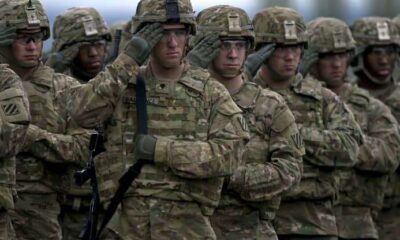- Trump Warns North Korea’s ‘Rocket Man’ in First UN Speech
President Donald Trump told world leaders in his first address to the United Nations that North Korea’s pursuit of nuclear weapons is a suicide mission that will lead to its destruction if not stopped by collective action by the rest of the world.
Trump delivered unusually stark denunciations of both North Korea and Iran, telling his audience — including officials from those two countries — that no nation can remain on the sidelines when rogue governments threaten war.
“No nation on Earth has an interest in seeing this band of criminals arm itself with nuclear weapons and missiles,” Trump said of North Korea, calling it a “depraved regime.”
If the dispute over its weapons programs leads to war, Trump said, “we will have no choice but to totally destroy North Korea.”
“Rocket Man is on a suicide mission for himself and for his regime,” Trump said, in a disparaging reference to North Korean leader Kim Jong-Un.
In a blunt and blistering speech, Trump also denounced governments in Syria, Iran and Venezuela, emphasizing that they all must be confronted by a coalition of “sovereign” nations. He said that he hopes the disputes would be resolved through the United Nations — “that’s what the United Nations is all about” — but he was critical of the institution, saying that it had too often concerned itself with “bureaucracy and process.”
The 42-minute address was met at times by light applause as Trump delivered it and when he concluded. His ambassador to the UN, Nikki Haley, Secretary of State Rex Tillerson and Treasury Secretary Steven Mnuchin sat in seats designated for the U.S. delegation. Trump’s daughter Ivanka, son-in-law Jared Kushner, son Eric and daughter-in-law Lara all attended the speech, as did the first lady, Melania Trump
‘Death and Destruction’
In Iran, Trump said, the trappings of democracy mask a “corrupt dictatorship.” The country must be forced to “end its pursuit of death and destruction. Above all, Iran’s government must stop supporting terrorists, begin serving its own people and respect the sovereign rights of its neighbors.”
Bashar al-Assad’s government in Syria, Trump said, is a “criminal regime” that has used chemical weapons “against his own citizens — even innocent children.”
Israeli Prime Minister Benjamin Netanyahu responded enthusiastically to the speech, repeatedly smiling and clapping. He has urged Trump to renegotiate or abandon the international agreement to curb Iran’s nuclear program signed by former President Barack Obama in 2015.
Trump repeated his own criticism of the agreement, calling it “an embarrassment to the United States.”
Venezuela ‘Dictatorship’
Trump labeled Venezuelan President Nicolas Maduro’s government a dictatorship, said it “has inflicted terrible pain and suffering” and imposed a “failed ideology” on its people, and threatened unspecified U.S. intervention.
“The problem in Venezuela is not that socialism has been poorly implemented, but that socialism has been faithfully implemented,” Trump said. “We are prepared to take further action if the government of Venezuela persists on its path to impose authoritarian rule on the Venezuelan people.”
The line on socialism drew murmurs from the UN audience.
The president communicated the depth of his determination to challenge both North Korea and Iran. Trump regards the speech as a moment of enormous opportunity to rally the world to rein in the two countries’ weapons programs.
After the speech, Trump told reporters: “I think it went really well. I said what I had to say,” according to Fox News.
Trump’s debut at the UN is his most consequential moment yet on the global diplomatic stage, with more at stake than at the two economic summits he attended in Europe earlier this year. Trump’s speech followed UN Secretary-General António Guterres, General Assembly President Miroslav Lajčák and Brazil’s President Michel Temer.
Escalating Menace
North Korea test-fired a ballistic missile with the range to reach the U.S. territory of Guam early on Friday, its latest in a series of provocations, and the Trump administration is seeking to extend and strengthen the Iranian nuclear deal that Obama signed and Trump has repeatedly maligned.
Trump said Monday the world will “‘see very soon” whether the U.S. withdraws from the Iranian nuclear deal. He faces an Oct. 15 deadline to inform Congress whether the U.S. will continue to certify Iran’s compliance with the international accord — a requirement from the president every 90 days.
The International Atomic Energy Agency has found Iran to be meeting its responsibilities under the 2015 accord, which capped the country’s nuclear program in exchange for sanctions relief.
Even so, the Trump administration argues the Islamic Republic is violating the spirit of the deal — citing its ongoing ballistic-missile program and policies the U.S. considers to be destabilizing the Middle East — and Nikki Haley, the U.S. ambassador to the UN, has said Trump may decide against re-certifying this time.
In recent weeks, critics of the accord have also seized on North Korea’s provocations and long-term pursuit of nuclear weapons as proof the U.S. needs to get tougher on Iran to prevent a similar threat.


 Billionaire Watch3 weeks ago
Billionaire Watch3 weeks ago
 Startups4 weeks ago
Startups4 weeks ago
 News4 weeks ago
News4 weeks ago
 News4 weeks ago
News4 weeks ago
 Bitcoin4 weeks ago
Bitcoin4 weeks ago
 Naira4 weeks ago
Naira4 weeks ago
 Forex3 weeks ago
Forex3 weeks ago
 Treasury Bills4 weeks ago
Treasury Bills4 weeks ago


























